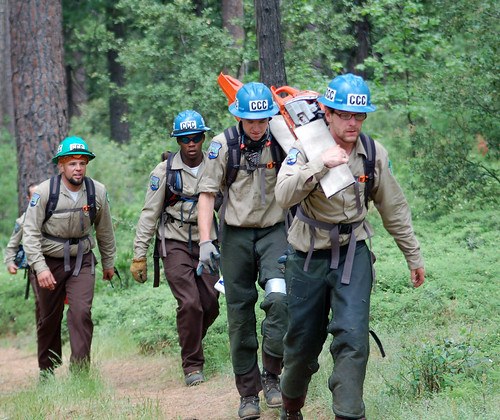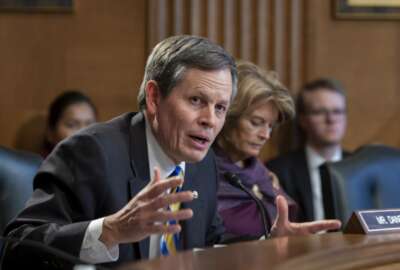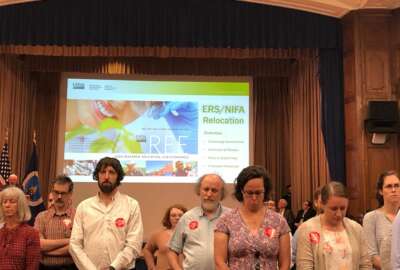
USDA reverses plan to close Job Corps centers ‘for the time being’
The Job Corps restructuring would have closed nine of USDA’s 25 centers and transferred the remaining 16 to Labor.
Best listening experience is on Chrome, Firefox or Safari. Subscribe to Federal Drive’s daily audio interviews on Apple Podcasts or PodcastOne.
The Agriculture Department has pulled back on its decision to close several of the Forest Service’s Job Corps Civilian Conservation Centers and move the remaining centers to the Labor Department, following bipartisan pushback from Congress and even President Donald Trump.
“For the time being, USDA does not intend to transfer these centers to DOL to allow management to determine a pathway that will maximize opportunity and results for students, minimize disruptions, and improve overall performance and integrity,” a USDA and DoL spokesperson told Federal News Network in a statement Thursday.

The spokesperson said DoL and USDA will conduct a “robust organizational review” to determine the best course of action for the Job Corps centers going forward, with respect to the Forest Service’s mission, the best use of taxpayer funds and the young students whom the program serves.
“As USDA looks to the future, it is imperative the USFS focuses on and prioritizes its core natural resource mission to improve the condition and resilience of our nation’s forests,” the spokesperson said.
The Job Corps restructuring would have closed nine of the Forest Service’s 25 centers located in Montana, Wisconsin, Virginia, Washington state, Kentucky, North Carolina and Oregon. The remaining 16 centers would’ve been transferred to DoL, which relies on contractors to run the 131 centers it already operates.
USDA expected the transition would have been completed by the end of September.
Job Corps Civilian Conservation Centers offer vocational training in more than 30 fields to teenagers and young adults who are 16-to-24 years old. Forest Service employees also train students to serve as first responders to disasters such as wildfires, floods, hurricanes and tornadoes.
President Lyndon Johnson launched the Job Corps program as part of his “War on Poverty” initiative, having borrowed the concept from the Civilian Conservation Corps President Franklin Roosevelt launched in 1933.
Earlier this month, Sens. John Tester (D-Mont.) and Steve Daines (R-Mont.) had introduced legislation as an amendment to the National Defense Authorization Act (NDAA) that would have blocked USDA from using government funds in 2019 or 2020 to close or privatize any of its Job Corps centers.
On June 3, Daines announced that he had spoken with Trump just days earlier, and had gotten a promise from the president that one of the nine Job Corps sites proposed for closure would remain open.
Days later, Senate Majority Leader Mitch McConnell (R-Ky.) had also urged USDA Secretary Sonny Perdue and Labor Secretary Alexandar Acosta to reconsider the Job Corps restructuring.
Tester said the Trump administration had reached the decision to close the centers “without any real reason or justification,” and touted the performance record of the two Job Corps centers in his state.
“But too often this administration acts without regard for the real-world consequences of their decisions — consequences overwhelmingly suffered by folks in rural America,” Tester said in a statement. “I’m extremely proud to have helped reverse this decision and I’ll continue to fight for the hardworking Montanans and businesses that rely on these Job Corps programs, so we can make sure they’re around for future generations.”
The Trump administration’s fiscal 2019 budget request also proposed moving the Forest Service’s centers, because, as the Government Accountability Office summarized in a June 2018 report, “workforce development is not a core mission of USDA, and the 25 centers it operates are overrepresented in the lowest performing cohort of centers.”
However, the DoL Office of Inspector General, in a March 2018 report, said the Job Corps centers run by the agency’s contractors “could not demonstrate the extent to which its training programs helped participants enter meaningful jobs appropriate to their training.”
Students at DoL’s Job Corps centers, the watchdog office concluded, “either found jobs through their own efforts or without clearly documented contractor assistance.”
The National Federation of Federal Employees, which represents Forest Service employees, estimates the 25 centers run by the Forest Service train about 5,000 at-risk students each year.
GAO has also raised concerns about the safety and security of the Job Corps program, citing 13,673 incidents involving students that happened between July 2016 and June 2017. GAO also noted two student deaths in 2015.
Related Stories
The Forest Service had notified staff in May about an upcoming reduction in force (RIF) that could target as many as 1,000 employees. Agency positions that faced layoffs included teachers, administrative staff and vocational staff who teach trades such as welding, business, finance and urban forestry.
The Forest Service has also offered Voluntary Early Retirement Authority and Voluntary Separation Incentive Payment to eligible employees.
Brittany Holder, a National Federation of Federal Employees spokeswoman, said the RIF wouldn’t likely go ahead as long as the centers remain open.
“We are extremely relieved for the more than 1,000 CCC employees who were slated to be laid off and the approximately 5,000 at-risk students that the program serves each year,” Holder said in an email Thursday.
Politico first reported this story on Thursday.
Copyright © 2025 Federal News Network. All rights reserved. This website is not intended for users located within the European Economic Area.
Jory Heckman is a reporter at Federal News Network covering U.S. Postal Service, IRS, big data and technology issues.
Follow @jheckmanWFED





